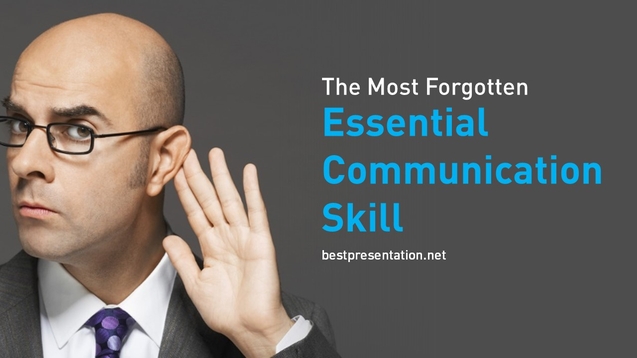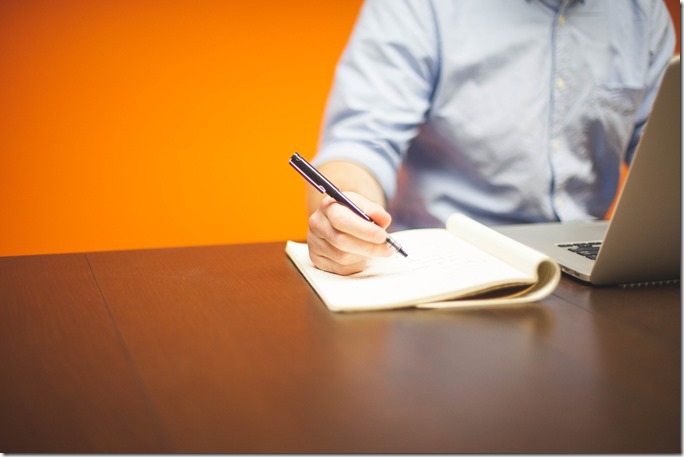
If there is someone known as great communicator, what do skill or character do you think he should have?
Most people will answer:
- He is very confident and dare to take the stage
- He is able to speak in front of public and elaborate his opinion
- He is able to influence others.
However most people usually forget to mention this skill, whereas without such skill he cannot be called as a great communicator, no matter how great is his charisma, ability to talk and influence other people.
That is why I call this skill as the most important skill which is forgotten by people. Do you know which skill it is?
This skill is nothing else but listening skill or the skill to listen.
There are many complaints, whether in company or family, just because we do not really listen and understand. Many leaders are also considered as ineffective because they listen less.
Why are we bad listeners?

The fact is that many of us are less-effective listeners. People often think that listening is something they do every day and automatically they master it.
But the reality is not quite the same. Here are some conditions that describe that we are not effective listeners. While reading the following list, ask yourself, “Am I doing those things?”
We listen merely to wait our turn to talk, not to learn to understand. As our turn to talk comes, we tell our opinion or experiences which are greater than other.
We already have our perception toward our interlocutor, while we listen. For example, “Ahh…. Budi is just a layman staff, nothing special in his ideas.” As the result, we stop exploring what the interlocutor means.
Those are some examples to point out that we are not good listeners.
The ability to listen is a skill we must learn. Doing it every day doesn’t make us expert in that. There are tips, tricks and techniques that we should learn, put them into practices and realize while we listen.
Why should we be better listeners?

Listening is the most wondrous gift we could give to people before us. When you listen, it means we give out time and focus totally to the interlocutor. In this time nowadays, time and focus are two things that are so rare. Aren’t they?
By listening to others thoroughly we make them feel respected . You make them think that they are significant –you make them feel important- where such thing is basic need for each person.
By doing those things we will get respect from our interlocutor. People will respect to those who listen and understand, not to those who always command and tell people what they must do.
Listening is also a basic for other communication skills, for instance persuasion and negotiation. Do you want to convince others? The first step is listening to what people desire and need.
That is why now let us learn to be better listener.
What are the Tips to be Better Listeners?

What can we do to be better listeners, who are able to make people fell respected?
Here are some tips we can put into our practices:
1. Give your effort to listen with focus
There are two words in English, hearing and listening. Hearing is the process of automatic listening, without any efforts. Listening is the process of listening with effort to get the understanding.
When we listen to a presentation, hearing means when we listen to the voice of the presenter. It doesn’t mean that we do the process of listening because we don’t understand what the presenter says.
Active listening needs effort. When listening, we must pay attention to understand what people say.
Besides, we also need to focus. If we don’t give our focus when we listen to others, people will not feel respected. For example, when your partner complains but you listen to his/her while playing with your hand phone.
We must try to get rid of things that can make us not focus in listening. When you speak to people, don’t speak while you play with your phone, or read newspaper, or do other things. Dedicate that moment only for the people in front of you.
2. Interpret what the interlocutor means
What people say is often different with what they mean. For example, when you arrive at home and ask to your wife, “How was your day, honey?” and she relpy,”Ya… I am fine.” (with unhappy face) If you still assume that your wife is okay, you are less sensitive.
How we interpret what the interlocutor means? Besides listening to the words, we must also pay attention to the intonation and body language of the interlocutor. This is what we call listening with ears, eyes and heart.
3. Respond appropriately
The way you respond what people say defines your effectiveness as listener. Don’t try to tell your own story or opinions. Often the best response is “hmm..”, “Okay …” or even nodding our head.
Besides, another response to show that you pay attention is by asking further. There are two functions of asking,
Asking to clarify
You can ask to convince what you listen is true, the aim is to confirm or make the speaker speak more. Here’s the example.
Budi : I love reading books about self development.
You : Oh, I see. You like self-development books. Don’t you?
You can notice that to clarify you can just repeat or paraphrase what the speaker says. By clarifying, you make sure what you understand corresponds with what the speaker says.
Asking to explore more deeply
You can ask to know further about the materials in the conversation. By asking, people will feel that you are really interested to know about what he or she is talking about. Here’s the example:
Budi : I love reading self-development books.
You : Ooo… I see. Who’s your favorite author?
And after that you can ask other questions, like:
- What is the most impressive book you’ve ever read?
- How can you like to read self-development books?
- And many other questions…
By asking, you will know more about your interlocutor. He will also feel that you are interested with what he is talking about. In the end of the conversation, he will even say that you are a good friend to talk to.
Those are the simple tips to be a better listener. The good news is that these tips can soon be put into your daily practices. So, happy practicing and make people feel they are special.
This active listening technique is a skill you can practice in our newest workshop, “Impactful Communication in the Workplace”. There you will learn the steps to make other people feel heard, paid attention, and special because of you.

